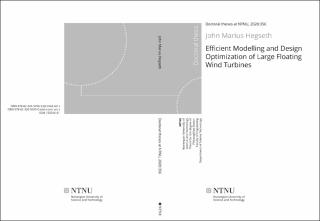| dc.contributor.advisor | Bachynski, Erin | |
| dc.contributor.advisor | Muskulus, Michael | |
| dc.contributor.advisor | Martins, Joaquin R. R. A. | |
| dc.contributor.author | Hegseth, John Marius | |
| dc.date.accessioned | 2020-11-17T13:30:19Z | |
| dc.date.available | 2020-11-17T13:30:19Z | |
| dc.date.issued | 2020 | |
| dc.identifier.isbn | 978-82-326-5059-0 | |
| dc.identifier.issn | 1503-8181 | |
| dc.identifier.uri | https://hdl.handle.net/11250/2688280 | |
| dc.description.abstract | Floating wind turbines (FWTs) are considered a promising solution for wind energy harvesting in deep water, but are currently too expensive to compete with other energy sources. Being a relatively new and immature technology means that there still is a large potential for cost reductions through optimization of the FWT structure. Optimized designs will bring the construction costs of FWTs down and increase profitability, which is currently the major challenge for the industry. Optimized designs can also result in increased reliability, which is an important issue.
The main purpose of this work was to improve the design process for FWTs and thus contribute to reducing the cost of energy. This is addressed through two overall research objectives, which consider i) increased computational efficiency of global design analyses for FWTs, and ii) methods for numerical iii iv design optimization which can help identify cost-effective and reliable design solutions. The main focus was on the support structure and controller for 10 MW spar-type turbines, considering fatigue and ultimate loads.
A linearized aero-hydro-servo-elastic model was shown to yield good results for the fatigue loads in the support structure. Acceptable agreement was also observed for short-term extreme response, especially for the support structure bending moments, which were quite Gaussian also in harsh environmental conditions. The resonant platform pitch response was overestimated by the linear model, especially in near-rated conditions.
A gradient-based optimization approach with analytic derivatives was developed to perform integrated design optimization of the support structure, blade-pitch controller, and mooring system for an elastic 10 MW spar FWT, including the scantling design of the hull, where the goal was to minimize a combination of design costs and rotor speed variation. Different control strategies were compared through integrated design of the controller and support structure, which allowed for identification of optimal control parameters in a lifetime perspective, and fair comparisons between different strategies. The impact of environmental modelling on the long-term fatigue reliability, and associated design costs, of the support structure was also assessed through re-design of the tower and platform.
The methodologies for global response analyses and integrated design optimization developed in the present work have been shown to be suitable for preliminary design of spar FWTs, where they can provide a starting design for later and more detailed design phases. Different modelling and design aspects for cost-effective and reliable solutions have been identified and assessed. The methodologies can be further extended to account for different FWT concepts, additional design parameters, and other load cases, and may help identify novel design solutions. | en_US |
| dc.language.iso | eng | en_US |
| dc.publisher | NTNU | en_US |
| dc.relation.ispartofseries | Doctoral theses at NTNU;2020:356 | |
| dc.relation.haspart | Paper 1: Hegseth, John Marius; Bachynski, Erin Elizabeth. A semi-analytical frequency domain model for efficient design evaluation of spar floating wind turbines. Marine Structures 2019 ;Volum 64. s. 186-210 | en_US |
| dc.relation.haspart | Paper 2: Silva de Souza, Carlos Eduardo; Hegseth, John Marius; Bachynski, Erin Elizabeth. Frequency-Dependent Aerodynamic Damping and Inertia in Linearized Dynamic Analysis of Floating Wind Turbines. Journal of Physics: Conference Series 2020 ;Volum 1452. | en_US |
| dc.relation.haspart | Paper 3: Hegseth, John Marius; Bachynski, Erin Elizabeth; Martins, Joaquim R. R. A.. Integrated design optimization of spar floating wind turbines. Marine Structures 2020 ;Volum 72. | en_US |
| dc.relation.haspart | Paper 4: Hegseth, John Marius; Bachynski, Erin Elizabeth; Martins, Joaquim R. R. A.. Design Optimization of Spar Floating Wind Turbines Considering Different Control Strategies. Journal of Physics: Conference Series 2020 ;Volum 1669. s. - | en_US |
| dc.relation.haspart | Paper 5: Hegseth, John Marius; Bachynski, Erin Elizabeth, Leira, Bernt J.. Effect of environmental modelling and inspection strategy on the optimal design of floating wind turbines. This article is awaiting submission and is therefore not included | en_US |
| dc.title | Efficient Modelling and Design Optimization of Large Floating Wind Turbines | en_US |
| dc.type | Doctoral thesis | en_US |
| dc.subject.nsi | VDP::Teknologi: 500::Marin teknologi: 580 | en_US |

